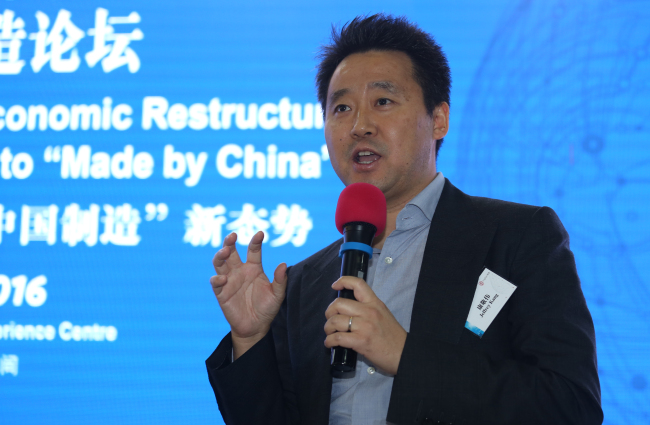SHENZHEN, China -- “Helping turn innovative ideas into products” is a goal shared by numerous tech start-up incubators and accelerators around the world.
In Shenzhen, China’s electronics manufacturing powerhouse, one company is looking to tackle this task by capitalizing on the city’s rich resources and its own strengths to establish a new ecosystem for smart device developers.
IngDan’s core mission is simple -- linking global start-ups making gadgets that utilize the Internet of Things, everyday Internet-connected products, with the right component suppliers in China.
 |
IngDan founder and CEO Jeffrey Kang speaks during the China Insights Forum at the IngDan Experience Center in Shenzhen last Friday. The event was cohosted by IngDan and China Daily. (China Daily) |
Using the resources of its parent company Cogobuy, a leading e-commerce platform for electronics components in China, IngDan plugs in IoT start-ups to the country’s extensive hardware supply chain, a resource that had only been available to major companies up to now.
“Our core mission is to help global IoT innovators and entrepreneurs access and take advantage of Shenzhen’s vast manufacturing resources (which small firms often find difficult to access on their own),” explained IngDan founder and CEO Jeffrey Kang during a forum held at the IngDan Experience Center in Shenzhen last Friday to discuss China’s manufacturing transformation.
“In the past, only multinational companies like Google, Cisco and Apple could use the rich resources here (in Shenzhen). My dream is to open up this scale of manufacturing resources to millions of young innovators and entrepreneurs across the world,” said the 46-year-old CEO.
Founded in 2013, IngDan works with a pool of more than 6,000 Chinese manufacturers, mainly electronics factories in Shenzhen and surrounding cities, to connect IoT start-ups with local suppliers able to meet the developers’ budgets and production requirements.
It has already helped launch some 10,000 IoT projects so far -- about 80 percent coming from mainland China and the rest mainly from the U.S, Israel, Europe, Japan and South Korea.
As a firm treading toward internationalization, IngDan believes its role goes beyond simply matching supply and demand. It hopes to improve Chinese manufacturing capabilities and revolutionize existing supply chain networks.
“By bringing global brains to China’s manufacturing resources, it helps Chinese manufacturers move from low-end to high-end manufacturing,” Kang said.
He also views IngDan’s service as a form of “sharing economy” -- the direct exchange of assets and services between related stakeholders at lower cost -- adapted to the manufacturing sector.
“I’m a believer of the sharing economy, and our job at IngDan is to use an Internet platform to link global innovators with China’s manufacturing base, open and available to everyone. We want to become the ‘Uber of the manufacturing industry,’” Kang said.
Aiming to further expand its global footprint and draw closer to its end goal, IngDan is planning to open more “experience centers” around the world to reach out to more IoT start-ups outside of China in the future.
At these centers, entrepreneurs can browse through the various smart gadgets that IngDan has helped launch and learn about IngDan’s services and partners.
For a start, the firm opened a new center in Hong Kong last Saturday, the first of its kind established overseas after Shenzhen and Beijing, setting a “key milestone toward the company’s strategy of internationalization,” according to Kang.
This year, the IoT supply chain platform operator plans to open five more experience centers internationally -- one each in Silicon Valley, Rome, Seoul, Tel Aviv and Tokyo.
It also plans to open 10 more experience centers in China, in addition to its Shenzhen and Beijing branches.
By Sohn Ji-young, Korea Herald correspondent (
jys@heraldcorp.com)






![[Herald Interview] 'Trump will use tariffs as first line of defense for American manufacturing'](http://res.heraldm.com/phpwas/restmb_idxmake.php?idx=644&simg=/content/image/2024/11/26/20241126050017_0.jpg)
![[Exclusive] Hyundai Mobis eyes closer ties with BYD](http://res.heraldm.com/phpwas/restmb_idxmake.php?idx=644&simg=/content/image/2024/11/25/20241125050044_0.jpg)
